BlueAlga:Agricultural chitosan Oligosaccharide producers (2)
With the continuous development of glycobiology in recent years, chitin, chitosan oligosaccharide and chitooligosaccharides have been discovered and put into research and development, especially in the field of nutraceuticals. So what is the relevance and what is the difference between these three?
Following the last sharing, today we continue to give you an introduction to the specific application of chitosan oligosaccharide in agriculture
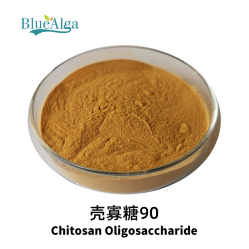
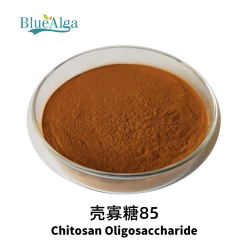
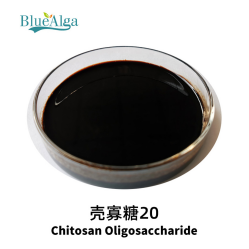
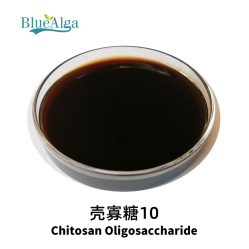
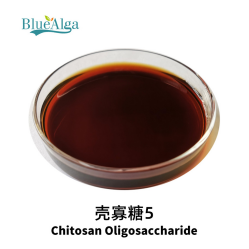
Fourth, the specific application of chitosan oligosaccharide
According to the many excellent characteristics of chitosan oligosaccharide, it can be developed into biopesticides, treatment agents, growth regulators and fertilizers.
1、Seed treatment agent
chitosan oligosaccharide can be used as seed treatment agent for many grain and vegetable crops. It can be used for seed treatment to improve the germination rate of seeds, enhance the disease resistance of seedlings, promote the growth of crops and increase the yield of crops.
2、Fruit and vegetable preservative
chitosan oligosaccharide has good film-forming property and certain selective permeability, which can change the internal gas composition of fruit tissues and reduce evaporation loss, thus inhibiting fruit decay and deterioration. Coupled with its broad-spectrum antibacterial properties, it can be applied to the preservation of fruits and vegetables.
3、Plant disease inducer, growth promoter
chitosan oligosaccharide can regulate the closure and opening of plant genes and induce plants to secrete resistance enzymes, which can not only promote the activation of plant cells and stimulate vegetative growth, but also increase the self-defense ability against pests and diseases, and reduce the harm of pathogenic bacteria, especially disease-causing fungi, to plants.
4、Soil conditioner
chitosan oligosaccharide can change the soil flora, promote the growth of beneficial microorganisms, improve the soil environment, and release the fixed medium and trace elements in the soil, so as to achieve the purpose of increasing production.
5、Fertilizer
Through the foliar spraying and root irrigation, flushing and other treatments on crops can effectively promote the development of the root system, and at the same time create a good soil environment for the root system, which has a good effect of rooting, root nourishment and root preservation.
How to recognize high quality chitosan oligosaccharide?
1、 Odor
The main smell chitosan oligosaccharide has no odor of sour rot. In the production process of chitosan oligosaccharide, dilute acid is used to dissolve chitosan oligosaccharide, and then degraded into chitosan oligosaccharide at the optimal temperature of biological enzymes, so chitosan oligosaccharide has a slightly sour odor. However, some poor quality chitosan oligosaccharide has a sour and rotten smell, this kind of chitosan oligosaccharide uses too much acid, the residual acid will degrade the chitosan oligosaccharide, leading to the increase of the content of glucosamine (monosaccharide) in chitosan oligosaccharide, and the residual acid will lead to the reduction of the actual content of chitosan oligosaccharide, thus seriously affecting the content and efficacy of chitosan oligosaccharide.
2. Appearance
Mainly look at the color of chitosan oligosaccharide and whether there are small black particles. At present, light yellow chitosan oligosaccharide can be prepared by low-temperature spray dryer after filtering, removing impurities and decolorizing by activated carbon. However, the inlet air temperature of spray drying for large production is 160-180℃, and chitosan oligosaccharide is easy to change color when it meets high temperature. If we want to keep the relatively light color of chitosan oligosaccharide itself in this process, we can deal with it from the following aspects.
① During the preparation process, the raw material of chitosan oligosaccharide will be decontaminated and treated to reduce the ash;
② Shorten the time of enzymatic reaction and membrane treatment to reduce the chance of oxidation of chitosan oligosaccharide and air contact;
③ Try to use lower spraying temperature under the condition of ensuring lower moisture. Prepare high-vitality chitosan oligosaccharide enzyme with optimized process, shorten the time of chitosan oligosaccharide enzymatic reaction, and prevent the oxidation reaction of chitooligosaccharides to the maximum extent;
④ Control the temperature of spray drying to prevent chitosan oligosaccharide from carbonization and blackening. Therefore, the high quality chitosan oligosaccharide has uniform color, light yellow color, and no black fine particles visible to the naked eye.
3、Dissolution
Dissolution is mainly observed in dissolution speed, clarity and color. If chitosan oligosaccharide contains too many impurities and ash, it will affect its dissolution speed, and some of them will become ball shape after adding into water, and will not disperse and dissolve for a long time. High-quality chitosan oligosaccharide is poured into water and dissolves evenly and quickly. The lighter the color of chitosan oligosaccharide solution with the same concentration, the better and clearer it is. The lighter the color of chitosan oligosaccharide solution, the less oxidized chitosan oligosaccharide and the higher effective content of chitosan oligosaccharide. chitosan oligosaccharide solution color is light, but there is an opaque feeling, this kind of chitosan oligosaccharide quality is not very good, the reason is either chitosan oligosaccharide molecular weight is large, difficult to dissolve in water; or there are many impurities, and chitosan oligosaccharide adsorption, presenting a turbid state.
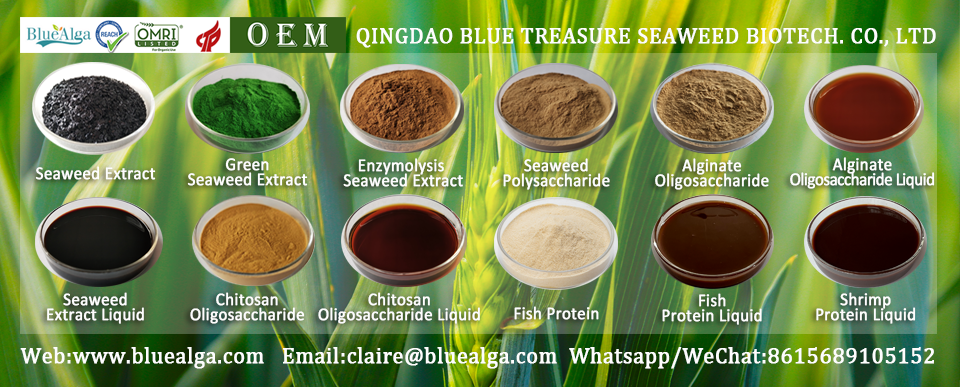



 Mobile: 86-13012553585 15610518510
Mobile: 86-13012553585 15610518510 Phone (Fax):86-53283197178
Phone (Fax):86-53283197178 E-mail: admin@bluealga.com
E-mail: admin@bluealga.com Add:No.918 Lingang 8 Road Huangdao District,Qingdao China 266400
Add:No.918 Lingang 8 Road Huangdao District,Qingdao China 266400

